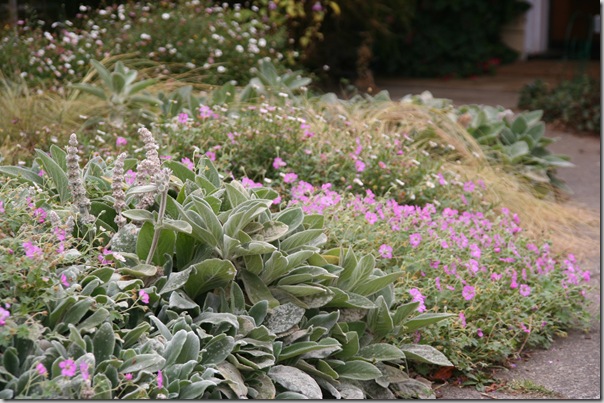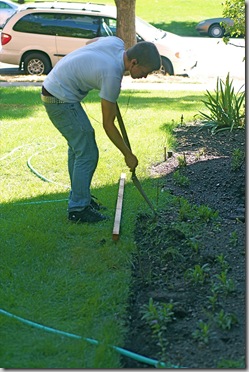
Do you have more garden than time? Even people who love, LOVE to garden sometimes find their landscape a source of guilt rather than joy.
So many times when I’m visiting a garden, I’m making enthusiastic exclamations over the abundance and beauty of it all, the owner of the garden is saying things like, “well, don’t look over there”, and “this area’s just a mess”, and “I haven’t gotten around to weeding lately”.
Even if the overall effect is lovely, when it’s our garden, we can get hung up on our to-do list instead of just appreciating how far we’ve come. If that’s you, there are a ton of things you can do to reduce the amount of work required of you, so that you’re able to focus on doing the things that bring you joy in the garden.
 If you’ve heard of Tim Ferriss, he’s the author of The Four-Hour Workweek, and he recommends automating, outsourcing and just plain stopping doing work that doesn’t thrill you. The title of his book is misleading, because I think he works longer hours than most people, but he spends his time doing what he loves, not on the repetitive, grindingly boring tasks that make up so many people’s days.
If you’ve heard of Tim Ferriss, he’s the author of The Four-Hour Workweek, and he recommends automating, outsourcing and just plain stopping doing work that doesn’t thrill you. The title of his book is misleading, because I think he works longer hours than most people, but he spends his time doing what he loves, not on the repetitive, grindingly boring tasks that make up so many people’s days.
Wouldn’t it be nice to have your garden be filled with just the tasks you love? To get to choose how much time to spend and what tasks to spend it on rather than being chained to a maintenance routine you find a chore?
To that end, I’ve adapted Ferriss’s advice for business success to the garden.
First, streamline – prevent unnecessary work from piling up:
If you can prevent work in the first place, it’s a lot simpler than struggling to find time for a recurring task. No sense paying someone to do a task that could be prevented in the first place, or worse, taking time away from your family and fun stuff to do a task like that yourself.
Mow high: Golf courses, with their velvety lawns that are cut an inch high, are maintained by salaried people with bachelor’s degrees in this kind of crazy turf maintenance. Golf course-style lawns are not sustainable for normal people with actual jobs.
If you mow on the highest setting on your mower, about 3 inches high, you can reduce your need for water and fertilizer, and shade out a huge proportion of the weeds that come up in your lawn. Time and money, both saved.

Plant in drifts: It’s been scientifically shown that plants conduct their own kind of chemical warfare to choke out invaders. If you’re trying for a fully-planted, lush garden, but you’re using the one-of-this, one-of-that approach, you’re spading yourself in the foot.
The plants themselves are noticing that their sworn enemy is right next to them, and Miss Phormium is sending out growth-inhibiting hormones to keep that mean old Aster from sprawling on her plot.
If you plant in bigger drifts, your plants will work in harmony with one another to cover the soil, choke out weeds, and stay lush and full with less coddling and fertilizer.
Mulch: Guys? You’ve heard this a hundred times, but it’s really true. If you don’t have a 3-inch thick layer of mulch in your garden, you’re spending a ton of time on weeding and watering tasks that you just don’t need to do. You don’t need weed mat, you just need wood chips. Lots of them.
Second, get rid of frustration so you can redefine “work”:
Maybe a task that tuckers you out is something you’d look forward to, if it weren’t for a a few frustrating aspects. Keep a close eye on your feelings in the garden, and if you feel a flash of irritation about something, don’t just put up with it – make it a priority to fix those tiny niggling things. Your garden should be a place of joy, and if a small tweak can make it so, then it’s probably worth it to do.
 Have good edging and broad, gently-sweeping lawn lines: If you’re having to manhandle your mower to get into awkward areas of lawn, or having to weed-whack your edges for it to look finished – well, I find that an unsatisfying way to spend my time.
Have good edging and broad, gently-sweeping lawn lines: If you’re having to manhandle your mower to get into awkward areas of lawn, or having to weed-whack your edges for it to look finished – well, I find that an unsatisfying way to spend my time.
If you’re going to have lawn, there are a lot of edging solutions – bender board, bricks or concrete mow-curbs that are laid low enough for you to run your mower right over – so that no weed-whacker is needed, and you don’t have to do any maintenance to keep your lawn from creeping into your garden beds.
Broad, gently sweeping lawn lines are the same deal – there should be no need to maneuver your mower back and forth to get all the tight corners. If you have an awkward area of lawn, change the border so you can mow easily. Awkward shapes are so much easier to plant than to mow!
Chuck anything you have to fuss with: One of my least-favorite plants are daylilies, because in my climate, after that first flush of gorgeous blooms, I’m left with the impossible task of trying to pick enough brown leaves out of that mess to make it look a respectable plant again. I pick and pick and finally just whack it down once I become convinced of my failure.
Do you have any plants like that? Something that’s always sick, never thriving, or is just a spoilt princess of a plant that needs constant fluffing to look good? If it makes you feel bad, just get rid of it! You have my professional blessing. Life’s too short.
Sharpen your tools: Clean, sharp, well-designed tools make a world of difference. I’ve coached clients who thought that gardening was very physically difficult. When I traded tools with them and used their rusty old loppers and ancient heavy shovel, I suddenly knew why!
Good tools are a gift to your body and your spirit. I don’t know how anyone can enjoy gardening when every cut is a struggle! High-quality tools should be an effortless extension of your body, and should make gardening a joy.
Last, automate and delegate:
Why do something you don’t like, when a computer or a company is tailor-made to do just those tasks? I’d never recommend automating away or outsourcing something you love to do, but let’s face it – there are tasks in every garden that make us feel more tired and guilty than energized and enthused. Get rid of the yuck so you can have fun with what’s left.
Drip irrigation and automatic sprinklers: Some people find watering their gardens soothing, and actually get out there on a regular schedule to do so. I know one of those people personally. The rest of us remember that we were supposed to water at 8pm, just after dark, when our favorite TV show is starting. Whoops.
Seriously. Let the computer remember to do it for you, and if you want a zen-like watering experience, you can always shut off the system and give things a sprinkle yourself. (More about watering here.)
 Hire a mow-and-blow service: Do you look forward to mowing your lawn all week? No? It’s so noisy you can’t even listen to your iPod while doing it? I thought so. Let someone take that off your hands. It’s cheaper than you think and the pleasure of being able to focus on the fun stuff in your garden is worth the money.
Hire a mow-and-blow service: Do you look forward to mowing your lawn all week? No? It’s so noisy you can’t even listen to your iPod while doing it? I thought so. Let someone take that off your hands. It’s cheaper than you think and the pleasure of being able to focus on the fun stuff in your garden is worth the money.
Hire a skilled landscape maintenance company: If you love your garden, but just can’t get to everything, there are services like mine where people come monthly and just give things a spruce-up. Many of my clients are super-passionate gardeners, but maybe the knees aren’t what they used to be or work’s been taking up extra hours.
Having monthly help can take the pressure off of garden maintenance, because you always know that the most important things will get done. If you usually spend eight hours a month in your garden, why not hire out four hours and just have the service do the fertilizing, repetitive pruning, weeds or other tasks you aren’t that keen on? It’s not wrong to enjoy deadheading and planting annuals but not want to do blackberry patrol on the outer edges of your garden.
Chill out:
This is advice we can all take. Gardens are lovely things, and a few weeds, deadheads, and undone tasks shouldn’t interfere with your enjoyment of the rest. If a garden was truly “finished”, it would mean you’d paved it over. So even when things aren’t perfect, just revel in what’s working and don’t dwell on the rest. There’s always another day!
What advice would you give to help someone enjoy their garden care more or shave time off maintenance? Let me know in the comments below.
Photo credits: Big Mind Zen Center, Krikit, and Ken Ratcliff.
12 responses to “Low-Maintenance Landscaping: How to Tim Ferriss Your Garden Routine”
Great post, useful advice.
Planting in drifts is still underestimated in value both for design and maintenance. Chemical warfare to ward off invaders is not widely known, I think this subject needs more elaboration.
Thanks Allan! I think you’re right, I rarely hear about the chemical warfare deal with plants. I’d love to learn more about the details of how that all works, myself.
Great post Gen, I love the headline and how you tied gardening to the book. Genius!
Ferriss will probably have you guest blogging for him soon 🙂
Chris
LOL, Chris, a girl can dream, a girl can dream…
Great post! All very good points. I am especially a fan of the automatic drip irrigation. Nothing’s better than not having to worry about whether or not your neighbours are watering as promised while you’re away on summer vacation!
I too think it is very creative how you related the book to gardening. I’m not familiar with the book but the wisdom is true with most everything.
For some folks though, it’s difficult to outsource or delegate those tasks that we feel nobody can do quite like us. Some gardeners are wayyyyy picky about their lawns and flower beds. “Letting Go” might be a needed topic to go along with the topic “chill out”. It could be a challenge for some folks.
Thanks for all the good advice.
Andrea, oh my gosh, me too. I am horrible at keeping my plants watered, and I have totally given up on containers for that reason. Irrigation is the wonderfullest invention ever! (Just need to install some in my own home garden and I’ll be as set as my clients are!!)
Steve,
Thanks for stopping by. I’m surprised you haven’t read Ferriss yet. Go, get it! So great for any business owner. I love your words about “letting go”. So true. I’m as particular as they come, so my clients are usually pretty able to let go, but it can be a challenge. I struggle with that with non-gardening things, wanting folks to do things in a precise way – I ought to take my own advice and chill! Cheers – Gen
Thanks Genevieve.
I do plan to get the book. The title itself makes me want to read it. Right now, If I could get a 40 hour work week it would be worth it.
Thanks again.
Gen, All great advice, especially at this time of the year when the garden chores will be coming along faster than many people can keep up with them. BTW, love the lawn mower bike, I’d love to give it a try!
Just finished reading the four hour blog and wanted to see what Tim ferriss does with his garden and found you!
Great article and good idea! I write a blog on my site (above) and would love you to write a post on my site if you liked it. Let me know!
[…] about low-maintenance planting design. A lot of people think that in order to have a low-maintenance landscape, you just need to choose low-maintenance plants. But the way you design your planting beds is as […]
[…] 18. Don’t grow fussy plants: choose varieties that are easy to take care of (plus some other great tips!) – North Coast Gardening […]